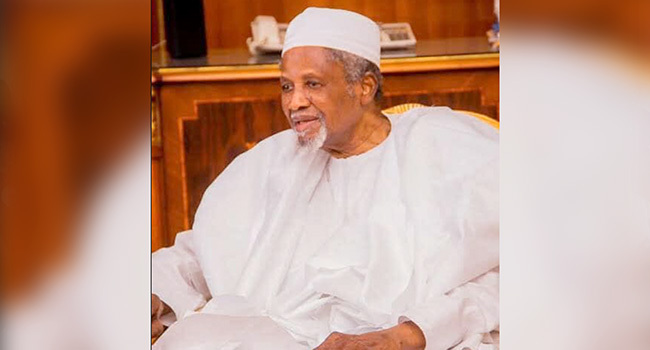Aminu Dantata is dead…10 things to know about Nigeria’s business icon

Business icon Aminu Dantata dies at 94
Alhaji Aminu Dantata, a towering figure in Nigeria’s business and philanthropic sectors, has passed away at the age of 94. Until his death, he was one of the last surviving titans of Nigeria’s first-generation entrepreneurs.
A respected industrialist, elder statesman, and patriarch of the Dantata dynasty, Aminu Dantata played a significant role in shaping commerce, education, and governance in Northern Nigeria. His legacy continues to influence the country’s economic and civic landscape.
1. Who Was Aminu Dantata?
Aminu Dantata was a legendary Nigerian businessman, philanthropist, and elder statesman born in 1931 in Kano. He was the son of Alhassan Dantata, one of the most successful merchants in colonial West Africa. Aminu inherited not just wealth but a powerful legacy built on trade, Islamic values, and community service. Known for his calm, reserved nature, he rose to become a respected figure in both private enterprise and public affairs, deeply rooted in the cultural and economic fabric of Northern Nigeria.
2. How Did He Build His Business Empire?
Dantata began his business journey early in life, helping to manage and expand the family’s trading empire. Under his leadership, the Dantata Group diversified from groundnut and kola nut trading into oil and gas, construction, manufacturing, and real estate. He was instrumental in founding and supporting several companies that shaped Nigeria’s private sector, including his involvement in MRS Oil and Jaiz Bank. His keen business acumen, combined with ethical leadership, positioned him as one of Nigeria’s most influential industrialists.
3. What Was His Role in Nigeria’s Economic Development?
Aminu Dantata’s investments created employment opportunities for thousands and stimulated regional economies, especially in Northern Nigeria. Through infrastructural development, agricultural partnerships, and strategic imports, he played a major role in Nigeria’s post-colonial commercial transition. He was a quiet force behind key economic reforms and supported Nigeria’s early financial institutions. His legacy continues to inspire conversations about indigenous wealth creation, ethical capitalism, and regional development through private-sector leadership.
4. Did Aminu Dantata Play Any Political Role?
Beyond business, Dantata served Nigeria in political and advisory roles. He was appointed Federal Commissioner for Trade (now Minister of Trade) during the administration of General Yakubu Gowon. In this capacity, he influenced trade policies that encouraged indigenous participation in commerce. While he was not an active partisan figure, he remained a trusted adviser to political leaders, helping bridge traditional, business, and governmental interests. His insights were often sought during periods of national transition and policy consultation.
5. What Are His Philanthropic Contributions?
Aminu Dantata’s philanthropy was one of the most defining features of his life. Rooted in Islamic teachings, he gave generously to causes ranging from health and education to humanitarian relief. He built mosques, funded schools, supported Islamic scholars, and contributed to disaster response efforts. His foundation supported widows, orphans, and internally displaced persons in Northern Nigeria. He believed wealth should serve the people and lived modestly despite his immense fortune, often giving away more than he spent on himself.
6. What Is the Dantata Family Known For?
The Dantata family is a household name in Nigerian commerce. With a history stretching back over a century, the family laid the foundation for modern African entrepreneurship. They are closely linked to Nigeria’s commercial history and the rise of many successful businesses, including the Dangote Group. Aliko Dangote, Africa’s richest man, is a descendant of this lineage. The Dantatas are not only known for wealth but for their quiet influence in religion, politics, and social development across West Africa.
7. How Did He Influence Younger Generations?
Dantata mentored several generations of businesspeople and public figures. Through personal relationships, scholarships, and vocational support, he helped many young Nigerians—especially from the North—build successful careers. His emphasis on honesty, humility, and long-term investment resonated with many aspiring entrepreneurs. He was an advocate for Islamic education and modernization, helping young professionals blend tradition with innovation. His influence helped bridge generational gaps in business and civic leadership.
8. What Did Nigerians Remember Most About Him?
Nigerians remember Dantata as a symbol of integrity, modesty, and purposeful wealth. He was not one for public attention, yet his influence was felt in every sector he touched. His name was synonymous with trust and selfless service. Across social media, mosques, business forums, and political platforms, tributes have highlighted his kindness, generosity, and unshakeable faith. To many, he embodied the ideal Nigerian elder—principled, visionary, and deeply committed to national unity and growth.
9. What Was the Cause of His Death?
Aminu Dantata passed away on June 28, 2025, in Kano, at the age of 94. While no critical illness was cited, family sources indicated that he died from age-related complications. In the months leading to his death, he had reportedly slowed down public engagements and focused on prayer and family. His passing marked the end of an era and was met with widespread mourning across Nigeria, particularly in the northern region where he was a revered figure.
10. How Will He Be Remembered?
Dantata will be remembered as one of Nigeria’s most impactful post-independence figures. His contributions to commerce, philanthropy, politics, and Islamic education left an indelible mark. He will be celebrated for building legacies that extended beyond wealth—ones rooted in compassion, community, and character. His burial in Kano drew dignitaries from across Nigeria, and prayers were held in his honour in cities and villages alike. He was not just a businessman; he was a bridge between generations, values, and visions.

